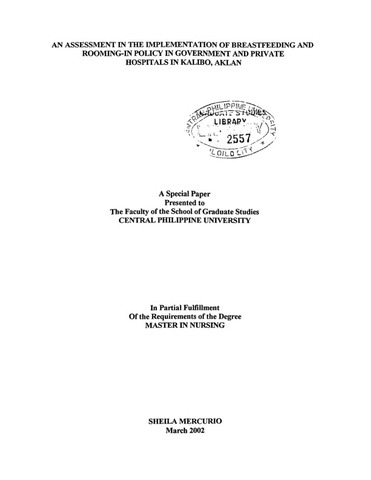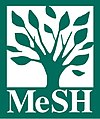An assessment in the implementation of breastfeeding and rooming-in policy in government and private hospitals in Kalibo, Aklan
Abstract
“The Rooming-in and Breastfeeding Act of 1992” (Republic Act 7600) affirms that the state adopts rooming-in as a national policy to encourage, protect and support the practice of breastfeeding. It shall create an environment where basic physical, emotional and psychological needs of mothers and infants are fulfilled through the practice of rooming-in and breastfeeding. The provision of this act shall apply to all private and government health institutions.”
Breastfeeding has distinct advantages which benefit the infant and the mother, including the hospital and the country that adopts its practice. It is the first preventive health measure that can be given to the child at birth. It also enhances mother-infant relationship.
Breastfeeding and breastmilk can make major contribution to lowering infant morbidity and mortality and improving maternal health. Infants who are breastfed have two-and-a-halftimes fewer illnesses than those who are bottle fed because breastfeeding is the most effective way to provide a baby with a caring environment and complete food which gives them protection against infections and diseases. Also, children who are breastfed are twenty-five times less likely to die from diarrhea since colostrum being a biologic liquid is non-irritating, easily absorbed and well tolerated. Moreover, exclusive breastfeeding for four to six months delays ovulation, therefore acts as a natural birth spacer. It provides 30 percent more protection against pregnancy than all organized family planning programs in the developing world combined Lactation Management Education Training (Maternal and Child Health Service, 1991).
Clearly, breastfeeding is vital for child’s survival and family planning. Breastfeeding saves lives and substantially contributes to increasing the birth interval in many countries throughout the world. In order to breastfed successfully, mothers need accurate and timely information, and adequate support system and encouragement.
The RA 7600 mandates the Department of Health (DOH), together with other government agencies, professional and non-governmental organizations to conduct information education, re-education and training programs for physicians, nurses, midwives, nutritionist-dietitians, community health workers and traditional birth attendants (TBA’s) and other health personnel on current and updated lactation management. Information materials shall be given to all health personnel involved in maternal and infant care in health institutions. The health institutions adopting rooming in and breastfeeding shall provide equipment, facilities and supplies for breastmilk collection, storage and utilization, standards of which shall be defined by the DOH.
The DOH considers health workers as a prime factor in the success or failure of RA 7600. They are the channels through which the government can promote breastfeeding because they have direct influence over mothers. However, many health care provider are still indifferent to the idea, choosing the easy way out. For instance when they see a mother bottle feeding her baby they usually do not intervene (Fifth Regular Session, Republic Act No. 7600, June 2, 1992).
There is no such thing as “Breastmilk Substitute.” It is good to note that the government’s position is that there is absolutely no alternative to pure breastfeeding from birth to six months. The government’s efforts at institutionalizing measures intended to promote breastfeeding has been commended. However, implementation of this program has not been very satisfactory.
In her long years of nursing experience this researcher has received feedback from Mother and Baby Friendly Hospital Initiative Monitoring Team that some hospital staff especially those assigned at Obstetric-Gynecology and Pediatric Wards do not implement the existing policy of the government.
Literature on this phenomenon is scarce, particularly in Region VI. This literature gap and the perceived need to look into the matter prompted the researcher to investigate the extent of compliance of health personnel with existing laws on breastfeeding and rooming-in.
Findings
1. The majority of the health care providers in this study were from government hospitals in Kalibo, Aklan and on the average were 33 years old and married. The sex ratio was 1 male to 6 females. Almost half of the groups were nurses.
2. The implementation of the breastfeeding and rooming in policy was very satisfactory.
3. The majority of the health care provider had favorable attitude towards the implementation of breastfeeding and rooming in policy.
4. A significant relationship exists between the perceptions on the implementation of breastfeeding and rooming in policy and two variables, namely age and sex. On the other hand no significant relationship exist between the perceptions on the implementation of breastfeeding and rooming in policy and position held in the hospital and type of hospital where employed.
5. A significant relationship exist between attitude of health care provider and their perceived degree of implementation of breastfeeding and rooming in policy.
Conclusions
Based on the foregoing findings, the following conclusions are drawn:
1. Generally, the health care providers in this study are nurses based in government hospitals, young in age, female and married.
2. The Breastfeeding and Rooming-In Policy has been very satisfactorily implemented.
3. The health care provider favored the implementation of Breastfeeding and Rooming-In Policy. This result concurred with the good performance of Region 6 as stated in one of the article in my related literature.
4. The younger the female health care provider they tend to have positive perception on the implementation of the Breastfeeding and Rooming-In Policy than the male and older counterparts.
5. The more favorable the attitude of the health care provider the more positive is the perception on the degree of implementation of Breastfeeding and Rooming-In Policy.
Recommendations
Based on the findings and conclusions, the following recommendations are given: Although the implementations of RA 7600 was generally very satisfactory, yet there were policies which have not been fully implemented, hence the recommendations are focused on these policies.
1. Since fostering the establishment of breastfeeding support groups and referring mothers to them on discharge from the hospital on clinic has not been very satisfactory, a special task force should be formed and establish linkage with the RH personnel who are presently doing massive implementation of maternal and child health program to establish breastfeeding support groups and refer the mothers to them on discharge from the hospital or clinic.
2. Another policy with lower mean was conduct of training of Health Care Staffon delivery skills necessary in the implementation of the breastfeeding and rooming-in policy. Hence, the researcher recommends that high priority be given on hands-on training of Health Care Staff and strict monitoring should be built-in the program to answer the implementation of such policy. This suggestion corresponds to Training in Baby Friendly Hospital Initiative found in my related literature.
3. helping mother initiate breastfeeding within a half-hour of birth should be implemented through laying of procedures in breastfeeding and orienting mothers and rehearsing them in such procedures so that their fears as well as hesitation can be overcome.
4. Further research should be done to determine the social and cultural factors hindering the implementation of Breastfeeding and Rooming-In Policy.
Description
Abstract only
Suggested Citation
Mercurio, S. (2002). An assessment in the implementation of breastfeeding and rooming-in policy in government and private hospitals in Kalibo, Aklan (Unpublished Master's special paper). Central Philippine University, Jaro, Iloilo City.
Type
Special paperSubject(s)
Keywords
Department
School of Graduate StudiesDegree
Master in NursingShelf Location
GSL Theses 610.73072 M539
Physical Description
viii, 57 leaves
Collections
- Master in Nursing [37]




